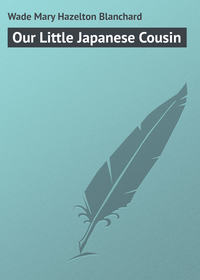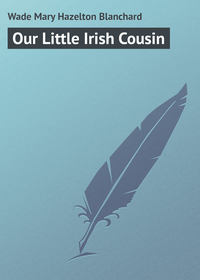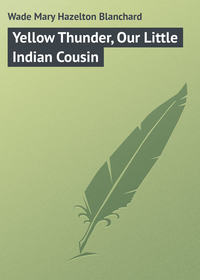 полная версия
полная версияAlila, Our Little Philippine Cousin
His eyes were fastened upon a poor little deer in the coil of his tail, which he had stretched down to trap his prey as it walked along. Ah! the deer's eyes close and the piteous cry stops as he is clasped more and more tightly in the clutch of the boa. And now the serpent raises him from the ground, and swings him against the trunk of the tree; he is thrown with such force he is instantly killed.
But what were Alila and his father doing all this time? They were too late to save the deer, but the boa did not escape. As he was about to descend the tree to feed upon his victim, his wicked eyes saw the hunters for the first time. Out darted his forked tongue in anger, just as two arrows entered his body and ended his life. The rest of the party came up at this moment and helped cut away the skin of the boa. It would be useful for making dagger sheaths.
Now indeed they would have a grand feast, for they could add the flesh of the deer and boa to what they had already obtained.
CHAPTER XIII.
CROCODILES
When dinner was over, they began to look around their stopping-place. They found they were close to a deep river. Should they swim across it, or turn homeward?
"You must not try to cross without a boat," said one of the men to Alila's father. "Crocodiles make their home in these waters. It is possible we may not see any from this shore, but at the same time, if you should try to swim to the other side, you might be attacked suddenly, and be unable to escape. I know one poor fellow who lost his life in this very place.
"Still, if you wish for more sport, I will tell you what to do. Let us all watch on the shore here for signs of crocodiles. We are in no hurry. Have your guns and arrows ready to help if one of the creatures should appear. I will dive into the river and attack him with my spear."
It was a daring thing to think of. As every one knew, there is only one place in the animal's body that can be pierced. That is directly under the fore legs. Even bullets will fly off from any other part of the scaly covering as though they had struck against a stone wall.
If the hunter venture to come close to such a monster, and his dagger fail to pierce the vital spot, there is no help for him. The great jaws will close upon him instantly, and he will never be seen again.
But the quiet Tagals seem to love danger, and no one tried to discourage the hunter. They walked quietly along the river's side for two hours, at least; they were about to turn when Alila cried:
"There he is, close to the bamboo thicket on the shore."
As they looked toward the spot, the fearful head and jaws of a crocodile could be seen reaching up out of the water.
Ready! Down dived the hunter, spear in hand. The attack was sudden and successful. The spear reached the one place it could enter, and stuck fast. The diver did not stop a moment longer, but swam back to the shore to his waiting friends. The surface of the river was instantly streaked with blood as the crocodile plunged through the water in his death agony.
The men waited till the great body of the monster became still and quiet. Then with the aid of rattan nooses they drew it up on the shore, and with their sharp knives proceeded to strip away the skin.
"It is a good medicine for rheumatism. I know it will cure the bad pains from which my mother suffers," said Alila's father.
"And I will take some of the flesh and dry it as a cure for asthma," said another of the party. "I know a man who suffers very much from the trouble. He will be glad to be able to breathe easily once more."
It was now near night and too late to think of starting home. They must camp out once more. Every one hoped to be free from the persistent leeches this time. They made a fire and stretched themselves beside it.
CHAPTER XIV.
TONDA'S STORY
"Tonda, do tell us some of your adventures," begged Alila. "You have travelled so far and seen such wonderful things! Father says you have even been to the great city of Manila. I wonder what a city can be like."
Tonda had certainly seen more of the world than any one Alila knew, and he was always proud and glad to show his knowledge. So, although he was tired and sleepy from the excitement of the day, he began to tell of his visit to Manila when a young man.
"Oh, a city is indeed a wonderful place, Alila; I believe you would be almost frightened, at first, at the queer noises you would hear.
"What would you think of long, heavy cars rushing along through the streets with no buffaloes to draw them and a single pony in their place? These cars run along on tracks through streets in which round stones are set in, side by side.
"There are great buildings divided by walls into many different rooms. Around one part of the city there is a strong wall which was built long, long ago, I was told. Behind those walls the people used to fight against their enemies and were safe.
"There is a river running right through the city, and upon it many kinds of boats sail at every hour of the day and night. While I was there, the Chinese had a grand festival. Great ships like floating palaces rode up and down the river. At night they were lighted up from topmast to stern. Bands of music kept playing, and every morning the Chinese who filled the vessels threw squares of coloured paper over the sides and burned incense in honour of St. Nicholas, in whose memory they held the festival.
"Why was St. Nicholas honoured so? Because in far distant times he saved the life of a Chinaman from the fury of a crocodile.
"It happened in this way. The man was sailing on the river in a small canoe, with no thought of danger. All at once, a crocodile appeared close to the boat, capsized it, and with open jaws was ready to devour the man. It was a fearful moment, but the Chinaman did not lose hope. He lifted up his voice in prayer to St. Nicholas, and begged him to save his life. The good saint appeared before him, and, striking the crocodile with his wand, changed it instantly into a rock.
"The man was saved, but you may be sure he did not forget the wonderful help he had received. He went back to Manila, and with the help of his friends built a chapel in honour of the saint. Every year since then the Chinese have gathered in the city and remembered the day when their countryman's life was saved. They hold one festival after another during two whole weeks. The people say that the city is always a gay sight at such times."
By the time this story was finished, the company gathered around the fire began to nod their heads. They were so tired from the day's hard work that they could listen no longer. A minute afterward Alila was sound asleep. He knew nothing more till the sunlight fell upon him the next morning.
On the way home two more boars and a deer were shot. A bamboo hurdle was quickly made, and the store of flesh was placed on it and easily carried on the shoulders of the men.
CHAPTER XV.
STRANGE NEIGHBOURS
You can imagine how glad Alila's mother was to see him back once more, safe and sound. She kissed him tenderly in the odd fashion of her people. When he had told her all his adventures, he said:
"Oh, mother, I want to go again. I haven't seen half of the strange things in those forests. And, besides, hunters have told me of queer people who live high up in the mountains beyond us. They are very wild, and have such strange customs. It is said that they lived in these islands before our people came here, hundreds and hundreds of years ago. They must have been driven up into the thick forests to save themselves from being captured.
"The men call them Negritos. They are very black, and do not look at all like us. Their hair is a great ball of curls. They do not know much more than animals."
"Yes, my child, I have not only heard about these savages, I have seen one of them," replied his mother. "Your father has been among them, and will tell you about their queer ways of living. They have no homes, but sleep at night under the trees. If you heard them talking, you would think at first it was the chattering of monkeys. They have very few words in their language.
"When they plant their gardens, they do not plough them as we do. They only scrape away the top of the earth, and then scatter their seed. They do not even clear places in the forests."
While she was telling Alila these things, his father was not there. As soon as he got back from the hunt, he went off to look over the farm to see if the hemp was growing well. When he returned from this work Alila went up to him, and said:
"Why is it, father, you have never told me about the Negritos? I never even heard of them till I went on the hunt with you and your friends."
"I knew how you like daring deeds, my boy, and felt you would be anxious to go among these savages and see them for yourself. So I waited till you should be older. Now you have shown how much you can bear, I will take you into strange places, and you shall see things for yourself. The Negritos are a cowardly race, yet they are dangerous; they always use poisoned arrows, and, from their safe hiding-places in the mountains, often succeed in killing any people who dare to come near them."
Then he told Alila how the Negrito children are taught to use their bows and arrows when very young. They learn to shoot so well they can hit the fish swimming in the water. They seldom fail to hit what they aim at.
These savages live mostly on roots and fruits. Still, they do know how to make a fire and cook some of their game. But they have no dishes, and the bird or animal to be eaten is thrown among the embers and allowed to stay there till the outside is burned to a crisp. When any one among them is very ill, they do not wait for him to die, but bury him alive.
One of the most laughable things Alila's father ever saw was a Negrito wedding. The young bride pretended to run away from her future husband. After he had caught her, they were carried up a bamboo ladder by their friends, and sprinkled with water out of a cocoanut shell. Then they came down and knelt on the ground, and an old man touched their heads together. That made them man and wife.
Alila was much interested, and begged his father to tell more stories of the Negritos and other savage tribes living in the depths of the island forests.
He listened to tales of the Igorrotes, who live in huts like beehives and creep into them like insects. They are people whom the white men have tried again and again to conquer and to teach of God, but they prefer to go naked and lead their own savage life.
And then his father described to him some of the sights he had seen. He told him of a wonderful cave right there in his own island of Luzon. It was equal in beauty to the cave Aladdin himself had entered.
Wonderful pendants of crystallised lime reached down from the lofty roof, shining like diamonds. There were pillars of the snowy lime a hundred feet in height, glittering in dazzling beauty. There were spacious halls leading one from another in this underground palace. It was a dangerous journey into this wonderful cave, but sometime Alila must go there, his father said.
He should visit the volcano island, too, – an island in the middle of a lake, from which terrible floods of lava and boiling water have poured forth many times. What sorrow and destruction it has caused!
A long, long time ago, the boy's father cannot tell how many years have passed, there was a terrible eruption. It lasted for many days. There were quakings of the earth and horrible sounds under ground. The air was filled with darkness save for flashes of lightning. Great columns of mud and sand arose from out the lake. Torrents of lava poured over the sides of the volcano and destroyed whole villages on the shores of the lake.
Ah! it was a fearful time for the people, and few of those who were there lived to tell the story to their children.
Alila's eyes grew larger as he listened to the wonders of the world around him. Yes, he would travel and see these things for himself. He was growing impatient. He could not wait much longer, for now he was nearly a man grown.
Sometime, let us hope, we shall meet our little Alila. We will ask him what he himself has learned that no one else can tell us.
CHAPTER XVI.
THE STOUT-HEARTED SAILOR
Although Alila is anxious to travel and learn more of this great round world, yet his own people seldom leave their island home. Strange to say, however, white travellers from distant lands began to visit these shores hundreds of years ago.
The first one to do this was a brave admiral named Ferdinand Magellan. What wonderful adventures filled the life of this man! It seems almost like a fairy tale.
After Columbus made his famous voyages across the Atlantic and discovered America, Magellan, who lived in Portugal, was much excited over the news. The world must certainly be round, he thought, and he was no longer satisfied to explore the waters near his own home. He, too, wished to find new and distant lands; but this was not enough. He felt sure he could discover a way to the countries of the East, rich in silks, spices, and precious gems, by sailing west.
The King of Portugal was a powerful ruler and anxious for new possessions, yet he did not encourage Magellan. Instead of this, he was ordered to go back to Africa and keep on fighting against the Moors, for he had already won many victories there. The king was even stern to him for leaving the war in Africa. Why had he returned to Portugal to ask for other work than what had been given him?
It was a sad disappointment, and Magellan turned away from the king's presence with a bitter heart. It was almost impossible for him to keep from bursting into tears, though he was a brave, strong man. Just as he was leaving the palace, an old friend stopped him and whispered:
"Why do you not go to the King of Spain and ask his help? He is young, to be sure, but he will be glad to get the services of a brave man from any country, for he is anxious to gain new lands and greater power."
Magellan's first thought was, "I cannot leave the service of my own country for that of another." But afterward he said to himself, "No, I am not right in working for one king when I can do more for the world in serving another. I feel that I shall do much yet. And I am willing to dare great risks, and give my life even, for the sake of what is not yet known."
He went to Spain and offered his services to King Charles. You will be pleased to know that this king was the grandson of the very Isabella who so nobly helped Columbus. The young king was filled with the spirit of his grandmother. He said to Magellan:
"Your plan is good; you are daring, yet cautious; you shall have ships and supplies. So be of good courage and prepare for your voyage."
Magellan's heart bounded with joy. He promised the king that wherever he should land in places not discovered before, there he would plant the flag of Spain. He also vowed that he would do his best to teach the Christian religion to the heathen and that a goodly company of priests should go with him to baptise all who were willing.
At last the great day came when Magellan set sail. Shortly before, he was married to one whom he had long loved and whom, alas! he should never see again after leaving the shores of Spain. He and his fair young wife had watched the building and repairing of the ships which were to sail away with him so soon. With her at his side, he had studied the rude maps of the Atlantic Ocean made by earlier voyagers, and the instruments which should aid him in managing the fleet.
The great moment arrived at last. Amidst the shouts of the people, the peals of the bells, and the roaring of the cannon, the anchors were lifted and the fleet sailed into the West.
Days passed quietly by. The weather was good, and Magellan, now Admiral Magellan, watched constantly for land. Many wonderful things were seen by the sailors as they crossed the broad Atlantic. There were shoals of flying-fish, strange and interesting birds, besides immense sharks that followed the ships for days at a time.
After a voyage of over two months, the coast of South America came in sight. The fleet stopped at different places; at one time finding themselves among friendly savages, at another among a race of unfriendly giants. Each time the ships were headed farther and farther south.
At this time Magellan had other troubles besides directing the fleet. You remember that he was a Portuguese, although he was sailing under the King of Spain. So it happened that while some of the sailors were from Magellan's country, most of them were Spaniards. These latter were jealous of their leader because he belonged to a different nation from themselves. Some of them talked secretly together and made a plan to imprison him and take possession of the ships.
But Magellan learned of their wicked plot in time to defeat them, and he punished them as they deserved. Only a cool and daring man could have succeeded in defeating so many strong enemies. But he did succeed, and the ships sailed onward as though nothing had happened.
It grew colder and colder. A violent storm arose and the ships were tossed about like leaves in the wind. But Magellan was without fear and kept his men filled with courage. At length he reached a narrow passage leading to the west. He said to his captains:
"I believe we have come to the end of this continent. If we can make our way through this strait we shall look upon the new ocean."
And the brave explorer sailed safely through the dangerous strait now named for him. The storm passed away, and one bright, clear morning Magellan looked for the first time upon a new and vast extent of water. It was the dreamed-of ocean. It looked so calm and peaceful that he said, "I will call it 'Pacific,' for I have never seen the like before."
Weeks were spent upon these waters. They were so quiet that for days at a time the ships could not advance. There was hardly a breath of wind.
And now it was discovered that the supplies were getting low. The sailors thought of home so far away, of friends they might never see again; they pictured death by starvation here in the midst of these beautiful waters. The food was served out in smaller and smaller portions to the unhappy men. At last they were told there was nothing left to satisfy their hunger save the rats which infested the ships and some ox-hides which had been used to protect the rigging.
Think for a moment of the condition of Magellan and those with him. They were out of sight of land in the midst of an unknown ocean. Some were already dying of thirst; others were too sick and weak to help in the care of the ship. Do you wonder that the sailors felt bitter at the one who had brought them here and was the cause of their suffering? But Magellan did not give up courage, even now. He ordered the hides to be softened in the sea water and then boiled. For some days longer the crews managed to live on with this for food.
One morning, when hope was nearly gone, a fresh breeze from the east filled the sails of the ships, and in a few hours Magellan saw land in the distance. The men's hearts beat hard for joy at the welcome sight. They soon reached a small island where ripe fruits were abundant, and where they could provide fresh supplies for the ships.
But they did not stay many days, for Magellan was not even now ready to give up his search for the famous lands of the East. He felt that, as the world was round, he must surely be near them by this time. So once more the ships set sail, and soon reached the shores of one of the Philippines, but a short distance from Alila's home. It looked so rich and beautiful that the ships anchored once more, and the admiral ordered the sick men to be taken on shore. Large tents were set up, and the sufferers were nursed back to health and strength. There was an abundance of good pure water and fresh food. All were soon well and strong.
There were no people living on this island, but two days after he arrived Magellan saw some canoes out upon the water. They were coming swiftly toward the camp. They were filled with natives of another island near by, who had seen the ships of the strangers; they were curious to look upon the white men who were living near them.
These people of Alila's race had soft yellow skins and beautiful white teeth. They wore no clothing except aprons made of bark. They danced around the great admiral as he stood on the shore dressed in his most elegant garments, and laughed and shouted. They wished him to see they were friendly. They offered fresh fish and palm wine, cocoanuts and figs, while Magellan made them wildly happy by giving them looking-glasses and bells, ivory toys and brass trinkets. As he found them honest and peaceful, he allowed them to go on board his ships. He ordered his men to fire the cannon to amuse them, but the noise frightened them so much that some of them jumped into the water and came near drowning.
The chief of these people came to see the Spaniards. His face was painted, and he wore heavy gold earrings and bracelets. He was kind and pleasant. He brought a boat-load of fruit and, best of all, some chickens.
Magellan learned from these people that he was near still richer and larger islands. After a few days he started out once more. He passed island after island, sometimes landing on their shores, sometimes sailing slowly along, drawing a map of these new and wonderful places.
At the island of Cebu, Magellan made friends with the king, who was baptised by the priests, and pretended to become a Christian. A large cross bearing a wooden crown was set up on the top of a high hill near the shore. It was a token to all travellers who should come this way that this land now belonged to the King of Spain.
While the white visitors were staying here, the King of Cebu did all he could to entertain them. He seemed anxious to show how friendly he felt toward them. The Spanish sailors were much interested in the strange customs and festivals of the brown people. They noticed that the food was only half cooked and then heavily salted. This made the eaters very thirsty, and quite ready to drink quantities of palm wine afterward. They sucked this through long reeds of bamboo. They were always glad to have the sailors share their feasts and entertainments.
Just as the fleet was about to set sail again, something happened to change Magellan's plans. The King of Cebu was in trouble. The people of another island over whom he was also the ruler were coming to make war upon him. Could the brave admiral refuse help, when the king had treated him so kindly? Surely not. He said to the king:
"Let me go against these rebels and make peace for you. I have cannons which I will use, and other weapons of war such as they have never seen before. They will be easily terrified, and quickly submit to your rule."
So it was that Magellan and sixty of his followers sailed against the enemy. But when they arrived at the island they found a large army ready to meet them. The warriors carried sharp spears, bows, and poisoned arrows, and each man was protected by a wooden shield. They stood upon the side of a hill. As Magellan and his men landed and advanced toward them, they rushed down upon the Spaniards with fury, surrounding them on all sides.
The great leader was calm and brave as usual, but there was little hope for success. In another hour he had fallen, a noble victim to his savage foes. Many of his followers fell by his side; the rest managed to escape to the ships and sail back to Cebu to tell the sad news to the king.
Thus ended the life of the noble Magellan, the first white man to cross the broad waters of the Pacific, the first one to show others it was indeed possible to sail around the world.
He was unlike many who lived in those old days, – for he did not care for gold or great possessions. He only wished to know more of this wonderful world, and to help others to greater wisdom. He gave his life for one whom he thought had need of help.
How did the King of Cebu act when he learned of the leader's death? He turned against those of his followers who were left, and they were obliged to depart in haste.
They made still other discoveries of great value. At length, sailing around the continent of Africa, they returned to Spain to tell of the brave deeds of their dead leader, the great admiral and navigator, and their own strange adventures.









